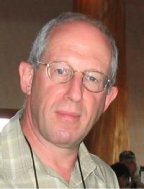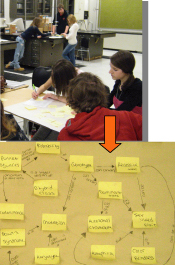Broadening High School Student Horizons with Science Connections
In addition to being both a Maury Educator and a COSEE-OS Educator, Bryan Field is a veteran teacher of 12 years and science faculty member at Conant High School in Jaffrey, New Hampshire. He currently instructs classes in physics as well as biological and marine sciences. He has a scientific background- a master’s degree in oceanography - which he still draws strongly upon in his teaching practice today. Bryan has attended two COSEE-OS workshops:
Teaching Sciences by Ocean Inquiry at the University of Maine Darling Marine Center in summer 2008 and the
Educator-Scientist Concept Mapping Workshop at the University of New Hampshire (UNH) in March 2009.
Bryan was very familiar with concept mapping prior to participating in the UNH workshop, and currently uses it in his practice to organize curricula and lesson plans as well as help students review material and make connections. He has found that asking his students to work in groups to discuss the relationship between the many vocabulary terms helps them to really ‘understand’ as opposed to just ‘know’ the definitions. Bryan has found that the process of concept mapping is "extremely useful for the clarification of ideas." shows sophomores in his college preparatory biology class creating group concept maps based on vocabulary terms from a unit on genetics as a formative assessment and review assignment prior to their taking a multiple choice quiz.
| |
|
| Sophomores in Bryan’s college preparatory biology class create a group concept map on genetics | |
|
In preparation for UNH workshop, Bryan and the other educator participants were asked by COSEE-OS staff to assess specific Ocean Literacy / Climate Literacy Principles (OL/CL) in terms of the “relevancy level” to their own teaching situations, as well as their “comfort level” with the content behind the principles. For the CL Principle addressing the topic of carbon cycling and climate change, he stated that he likes for his students to “spend a lot of time working on the impact of humanity in the sea…covering climate change topics through exploration of biogeochemical cycling, carbon dioxide build-up, removal by algae, ocean acidification…” To help with these complex topics, Bryan enjoys encouraging his students to think of “systems ramifications” – how do all the parts of the ocean and climate systems link together at different spatial and temporal scales?
As a result of the UNH collaborative workshop, Bryan reports he will be able to show his students how to directly use the online Ocean Climate Interactive and the Concept Map Builder so they can build their own maps. Bryan plans to use the methods he learned at the COSEE-OS workshop to help his students organize information and see "the bigger story." He has shared his thoughts as to how he and his students react to and use concept mapping:
"I love the [COSEE-OS] tools and plan to use it with next year’s Oceanography classes. I tend not to be a linear thinker and find the standard outlining method does not work for me. On the other hand mapping seems to help me organize my thoughts and even think of connections and terms that wouldn't have occurred to me other wise. I know this is true for many of my students as well. Students tend to compartmentalize information, rather than make connections. With mapping they are forced to consider the relationships between, what are to them, otherwise disconnected terms."







